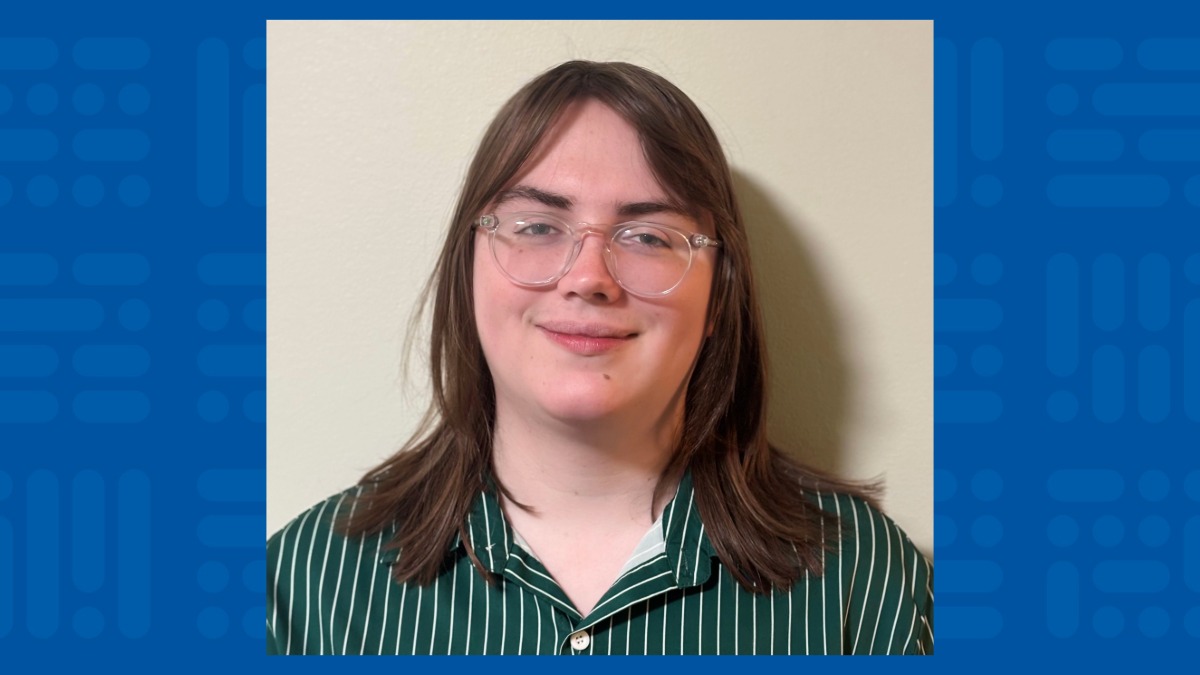Purpose and Health

CEHD rising senior Logan Szelestei studies the relationship between lifetime trauma and purpose in life among older adults
During National Wellness Month this August, many people are taking the time to drink more water, reconsider their exercise routines or prioritize their mental health. As a double major in human services and psychology, supporting the well-being of their community members is often top of mind for University of Delaware rising senior and first-generation college student Logan Szelestei. They celebrated the month with a presentation on an important, but often overlooked aspect of wellness: the social determinants of health, or how a person’s education, environment or other social factors affect their well-being.
Through UD’s undergraduate summer research program, Szelestei studied the relationship between exposure to lifetime traumas and a person’s sense of purpose in life, or their ability to pursue goals and find meaning in their life. A strong sense of purpose in life often reduces a person’s stress and improves resilience.
“I was interested in this project as social determinants of health are personally fascinating in their implications, and lifetime trauma is relatively understudied among older adults,” Szelestei said. “After I graduate, I aim to attend graduate school to earn my master’s degree in social work and become a licensed social worker. I think this research will help me better understand my future clients and their needs.”
Under the mentorship of Assistant Professor Heather Farmer, Szelestei developed their own project to fill an important gap in the research. While many studies focus on the associations between adverse childhood experiences and psychological well-being, very little research focuses on whether exposure to various traumas across the lifespan could lead to a diminished sense of purpose in life in midlife to older ages.
“Logan very much took a lead role in this project,” said Farmer, who studies racial/ethnic disparities in health in the College of Education and Human Development’s (CEHD) Department of Human Development and Family Sciences. “They reviewed the literature to refine their research question, provided me with the variables they wanted to include in the study, gave me a summary of the statistical analyses they wanted to run and put together an outline for a future publication about this project.”
Using information from the Health and Retirement Study, which provides nationally-representative survey data to researchers, policy analysts and program planners, Szelestei found that exposure to a greater burden of lifetime trauma was significantly associated with lower purpose in life, as reported by the sample of adults ages 51 and older. As Szelestei predicted, participants who reported more lifetime traumas such as surviving a serious physical attack or enduring a life threatening illness, for example, generally reported that they struggled to find a sense of direction and make plans for their future. With this finding, professionals in human services, counseling and social work can better identify clients who need psychological support and focus on strengthening their purpose in life.
Szelestei shared their research through a poster titled “Lifetime Trauma Reduces Purpose in Life Among Older Adults” at UD’s Symposium for Undergraduate Research and Creative Activity on August 14, joining 500 undergraduates who participated in summer research across the university. The symposium highlighted undergraduate discovery and gave students experience in sharing their work, an important skill for researchers across disciplines.
Szelestei credits the program with helping them refine their planning skills, while developing greater flexibility and independence. They also shared their appreciation for the mentorship of Farmer, who served as Szelestei’s advisor in this and other projects.
“A favorite memory from my time in CEHD has to be my working relationship with Dr. Farmer,” Szelestei said. “She has been both a great professor and mentor to me, and I cannot imagine it any other way.”
This spring, Szelestei is looking forward to celebrating their accomplishments and UD journey at CEHD’s Convocation ceremony.
“I am a first generation college student and will become the first person in my family to complete a four-year undergraduate degree this coming spring, so I am excited for that,” Szelestei said.
Article by Jessica Henderson. Photo courtesy of Logan Szeslestei.
Photo caption: Logan Szeslestei is a rising senior in CEHD’s human services program and CAS’ psychology program.



